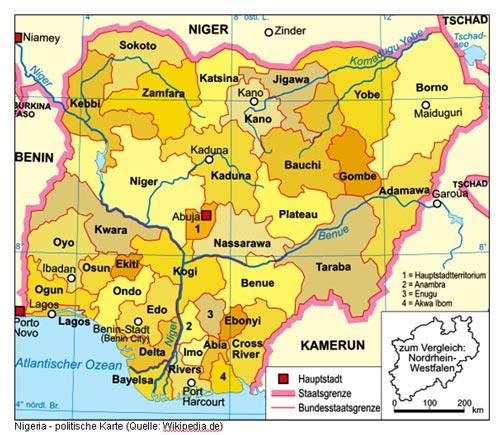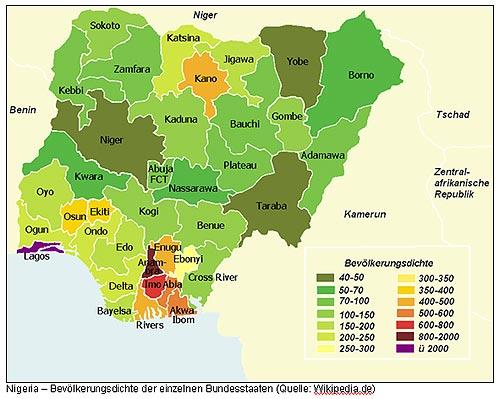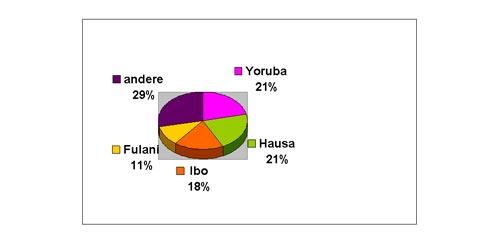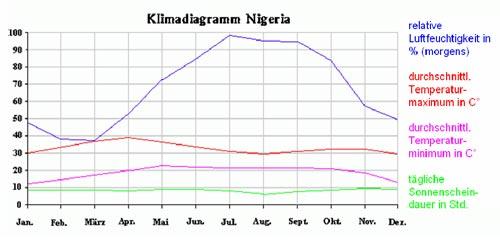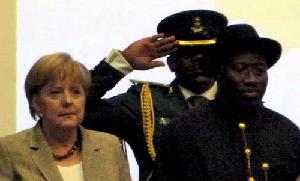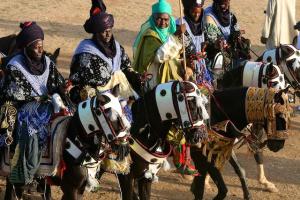German Chancellor visits Nigeria and President Jonathan [en] - Foundation Office Nigeria
Asset Publisher
German Chancellor visits Nigeria and President Jonathan
Asset Publisher
As part of her Africa-Trip, Chancellor Dr. Angela Merkel also visited Nigeria from July 14-15. She congratulated President Goodluck Jonathan, who was re-elected with a clear majority in April, in the fairest Nigerian elections for a long time. In the joint press conference she said: “We wish the new government … every success. Nigeria still has to overcome various problems … We want to assist Nigeria in doing so. We do this for example in the area of our development cooperation.”
Merkel dunned for the compliance of the human rights and emphasized, how important it is to combat increasing terrorism and violence in Nigeria. Thereby, particular attention should also be given to the rights of minorities. President Jonathan thanked for the visit, which “comes exactly at the right time at the beginning of the new term of the government”, and is “unique”. He would gladly deepen the relations with Germany.
Economic Cooperation
Merkel and Jonathan also opened together the German-Nigerian economic forum, which has been hold alternating in Nigeria and Germany for several years. It serves to deepen economic relations between both.
Merkel and Jonathan emphasized the meaning of both countries for each other, particularly in the economic perspective. The energy partnership, which exists since several years, is to be intensified. Nigeria is not only an important oil-producer, but also has the eight-largest gas deposits in the world. However, it didn’t use these reserves until now and flared more gas than the rest of Africa consumes. In the future, Germany and Nigeria plan to cooperate more closely in the field of liquefied gas (LNG) – given the planned withdrawal from the nuclear energy programme of Germany an important option. Nigeria, by the way, has also a nuclear programme and a Reactor Safety Commission.
A bilateral Commission is to be established, which shall deepen the German-Nigerian relations. Furthermore, Merkel recommended Nigeria to diversify its economy beyond the oil and gas production.
Indeed, for years there has been a process of de-industrialization in Nigeria. (The Video-Clip gives an insight in the methods of traditional textile processing: A structure is shaped with mallets into the textiles.)
Rent-Seeking (in the economic perspective: effortless income), is a characterizing feature of the Nigerian economic system (s. 2nd Video-Clip). In the northern city of Kano, for example, out of approximately 7 Mio. inhabitants, 2 Mio. are supposedly beggars. Corruption is widespread.
Mrs. Merkel also visited the ECOWAS secretariat, which is located in Abuja. ECOWAS is the “Economic Community” of West-African states.
Dialogue of Religions
Another part in Merkel’s programme was a dialogue with Christian and Islamic leaders. In Nigeria, violent conflicts are frequent, which are often religiously coloured, whereas deeper causes must be sought in ethnic rivalries and in the access to resources. The traditional Islamic rulers brought their entourage, who gave the Hilton Hotel with their traditional garments and turbans the character of an oriental marketplace (s. picture of riding games/Durbar in the sidebar).
Among the participants were inter alia the Sultan of Sokoto (the highest-ranking representative of Islam), the Emir of Wase, the Chief Imam of Abuja, archbishop Kaigama of Jos in Plateau State, with whose Justice, Development, and Peace Commission KAS is cooperating closely, as well as the recently appointed bishop of Sokoto, Msgr. Matthew Hassan Kukah, with whom KAS also cooperates frequently.
Dialogue with Members of the German Bundestag (Federal Parliament)
To the delegation of the chancellor belonged the Honourable M.P. Hartwig Fischer, CDU/CSU; Michael Glos, CDU/CSU (former federal minister); Ute Koczy, BÜNDNIS 90/DIE GRÜNEN; Christoph Strässer, SPD; Alexander Ulrich, DIE LINKE; and Dr. Claudia Winterstein, FDP.
For them, the German Embassy in cooperation with KAS, FES, HBS, GIZ and GI organized a background discussion, which covered wide aspects of the country’s problems. The Honourable M.P. thanked for the discussion, which also illustrated the good relation between the German organizations and to the Embassy.
Security Policy
Germany and Nigeria are both important candidates for a permanent seat in the UN Security Council. Apparently, they will support each other. The German discussion about the planned delivery of speedboats to Angola puzzles Nigerian observers, however. They know the situation in their own waters just too well: The Gulf of Guinea is contaminated by pirates, who rob oil, kidnap people, and smuggle in drugs from Latin America. Although the Angolan situation is not known here very well – securing the coasts is considered as an urgent task.
Likewise a great deal of understanding was given to the recognition that the chancellor paid to the peace missions of African states. Nigeria sends probably the largest contingents. KAS in Nigeria trained meanwhile several hundred officers to de-escalate conflicts within the country and abroad, and familiarized them with the methods of “necessary minimum force”. A colonel for example called the KAS country representative in the middle of an operation to thank for the trainings.
Press Coverage
The Nigerian press reported friendly, with large pictures on the front pages and extensive articles.
Some German media criticized, that the visit of the chancellor was too short. It would be fair, however, to mention, that she is the first Head of Government of an important country, who visited Nigeria after the elections and thereby showed respect for the overall quite acceptable elections. Nigerian observers knew to respect in particular, that the chancellor took the time for a visit amidst a complicated monetary situation in Europe. Mrs. Merkel invited President Jonathan to Germany in the year 2012.



